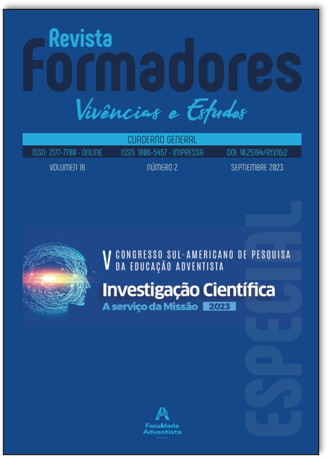EDUCACIÓN Y CULTURA FINANCIERA EN ESTUDIANTES UNIVERSITARIOS: UN ESTUDIO DE CASO EN UNA UNIVERSIDAD PRIVADA DE ARGENTINA
DOI:
https://doi.org/10.25194/rf.v16i2.1732Keywords:
financial literacy, financial culture, personal finance, university studentsAbstract
In recent years, financial inclusion has become a central topic in public policies worldwide, including in Argentina. Achieving real financial inclusion requires a focus on developing financial education, identifying financial culture, and enabling access to financial products. The lack of financial education can lead people to misjudge risks and make wrong decisions, which can impact their current and future quality of life. In universities, it is increasingly common to find programs and activities that support the financial education and culture of young people. This study aimed to identify the levels of financial culture and education among students at a private university in Argentina. To do so, a data collection instrument developed in Mexico was used to measure the level of financial culture and education, which presented reliability and validity indicators like those found in its initial validation. Around 480 university students were surveyed, and it was found that they have a good level of financial culture and education. However, there is still a significant knowledge gap in more complex financial products and long-term investments for retirement contributions. Therefore, it is suggested to deepen the topic in future research, complementing the data with qualitative information to expand knowledge about the profile of the students. In conclusion, financial education and inclusion are fundamental to a healthy and equitable economic life. The research demonstrates the need to continue promoting financial education and expanding access to more complex financial products, especially for long-term retirement contributions
References
AKTOUF, Omar. Ensino de Administração: por uma pedagogia para a mudança. Organizações & Sociedade, v. 12, n. 35, p. 151-159, 2005.
ALSEMGEEST, Liezel. Arguments for and against financial literacy education: Where to go from here? International Journal of Consumer Studies, v. 39, n. 2, p. 155-161, 2015.
BCRA - CAF. Encuesta de Medición de Capacidades Financieras en Argentina - Año 2017. Buenos Aires. Recuperado de la página web de Banco Central de la República Argentina. 2017.
BLUE, Levon; GROOTENBOER, Peter; BRIMBLE, Mark. Financial literacy education in the curriculum: Making the grade or missing the mark? International Review of Economics Education, v. 16, n. A, p. 51-62, 2014.
BLUE, Levon Ellen; GROOTENBOER, Peter. A praxis approach to financial literacy education. Journal of Curriculum Studies, v. 51, n. 5, p. 755-770, 2019.
CSORBA, L. The determining factors of financial culture, financial literacy and financial behavior. Public Finance Quarterly, , V. 65, p. 67–83, 2020.
DE BECKKER, Kenneth; DE WITTE, Kristof; VAN CAMPENHOUT, Geert. The role of national culture in financial literacy: Cross-country evidence. Journal of Consumer Affairs, v. 54, n. 3, p. 912-930, 2020.
DEL CARMEN BRIANO TURRENT, G., QUEVEDO MONJARÁS, L. M., & CASTAÑÓN NIETO, E. Midiendo la cultura financiera en estudiantes universitarios: El caso de la Facultad de Contaduría y Administración de la UASLP. Mexíco, 2016.
DO ROSARIO, J. El 70% de los argentinos respondió mal este test de finanzas básicas. Infobae. Recuperado de https://www.infobae.com/2016/01/19/1784039-el-70-los-argentinos-respondio-mal-este-test-finanzas-basicas/ , 2016.
FERRADA, Cristian; DÍAZ-LEVICOY, Danilo; PURAIVAN, Eduardo; LIZANA, Alexis. Revisión Sistemática Sobre Educación Financiera en el Contexto Educativo Primario. Revista Lasallista de Investigación, v. 19, n. 1, p. 21-32, 2022.
GAIDO, P. Endeudamiento y exclusión: consecuencias tangibles por la falta de educación financiera. Reporte Fintech. Recuperado de https://www.reportefintech.com/endeudamiento-exclusion-consecuencias-tangibles-la-falta-educacion-financiera/ , 2019.
GITMAN, L. y Joehnk, M. Fundamentos de inversiones (10a. ed.). Distrito Federal: Pearson Educación. 2008.
GONZALEZ, I., ARAUJO, E. y CALDAS, A. Investimento Financeiro: Uma Análise do Perfil Investidor dos Universitários do Recóncavo da Bahia. Revista de Gestão e Contabilidade da UFPI, 2(2), 96–114. 2015.
HASAN, Morshadul; LE, Thi; HOQUE, Ariful. How does financial literacy impact on inclusive finance? Financial Innovation, v. 7, n. 40, p. 1-15, 2021.
KAISER, T., LUSARDI, A., MENKHOFF, L., & URBAN, C. Financial education affects financial knowledge and downstream behaviors. Journal of Financial Economics, 145(2), 2022.
KLAPPER, L., LUSARDI, A., & VAN OUDHEUSDEN, P. Financial literacy around the worl. Washington DC. Recuperado de la página web de World Bank. 2018.
MINISTERIO DE HACIENDA. Estrategia Nacional de Inclusión Financiera. Buenos Aires. Recuperado de la página web de Presidencia de la Nación, 2019.
SANTOYO-LEDESMAN, D. S. ; LUNA-NEMECIO, J. Experiencia exploratoria de validación de un instrumento sobre nivel de cultura financiera en la generación millenial. Revista de métodos cuantitativos para la economía y la empresa. N. 31, pag. 226-239, 2021.
SOROKO, Agata. Teaching young people more than “how to survive austerity”: From traditional financial literacy to critical economic literacy education. Theory & Research in Social Education, v. 51, n. 1, p. 128-156, 2022.
WEBER, Max. A ética protestante e o espírito do capitalismo. Tradução de Smrecsányl, M. Irene de Q. F.; Smrecsányl, Tamás J. K. M. São Paulo: Pioneira, 1999.


